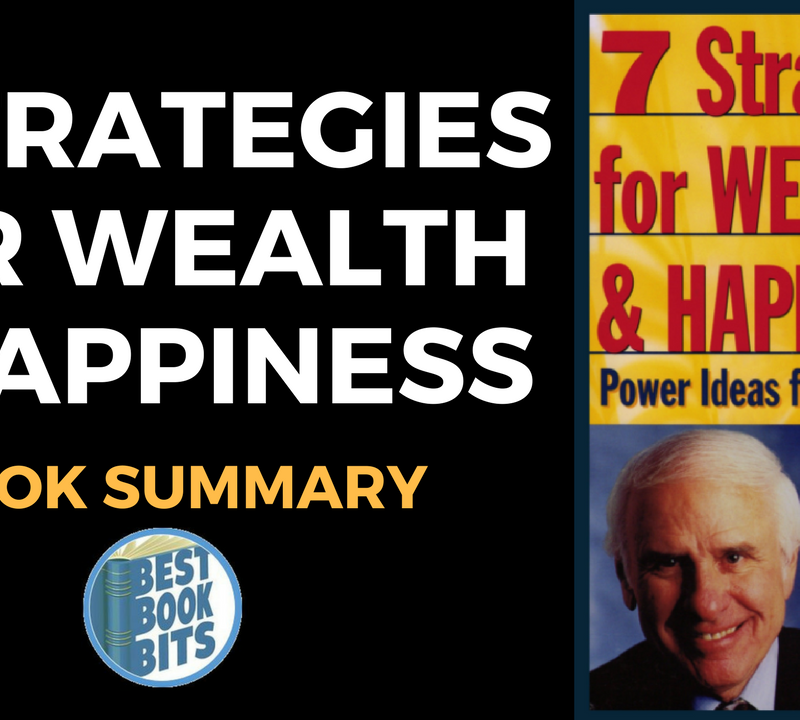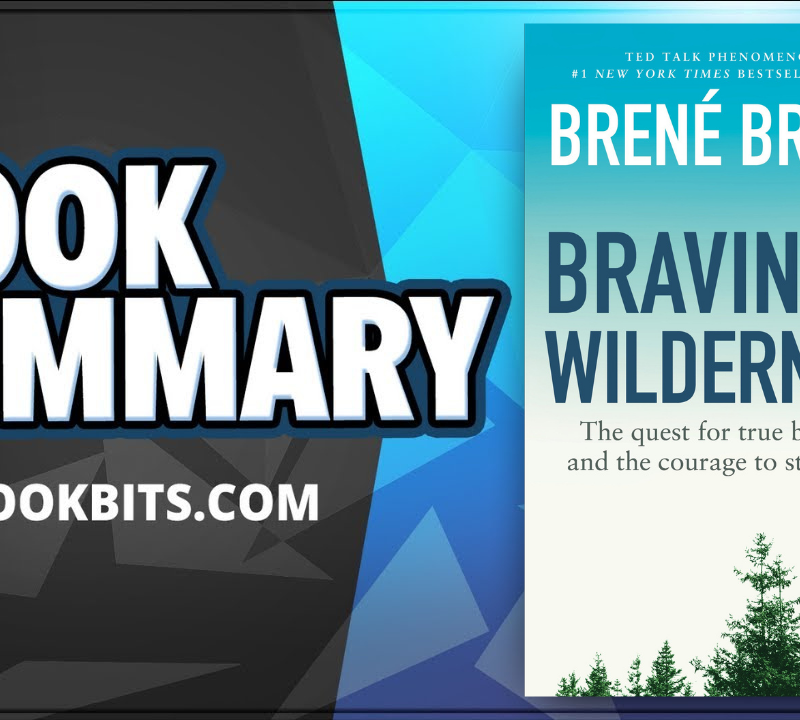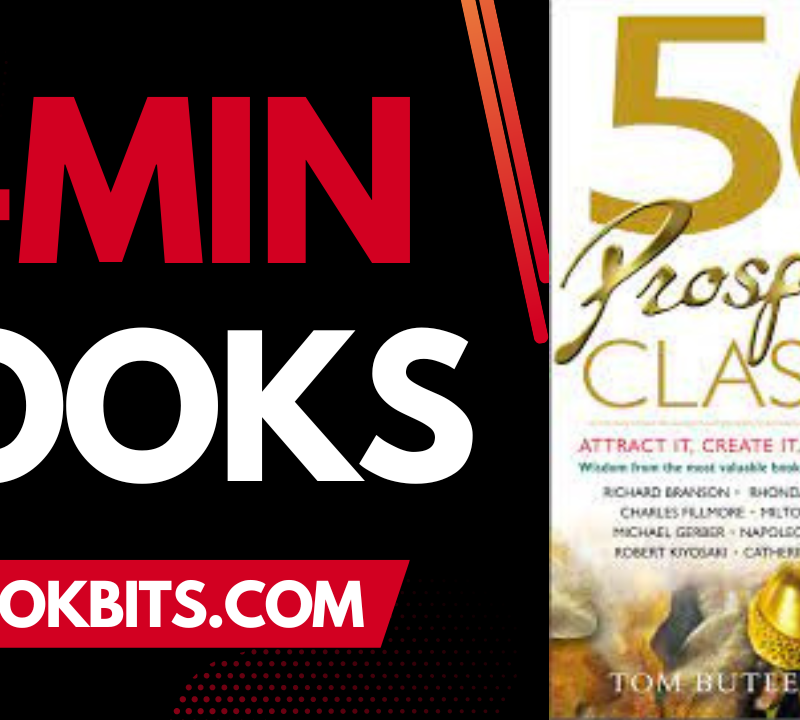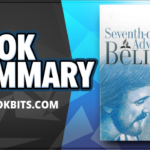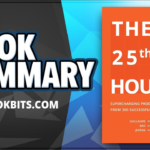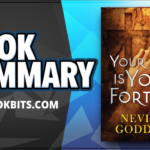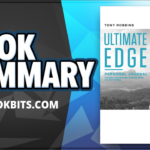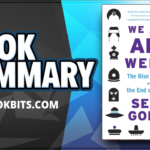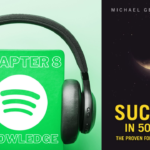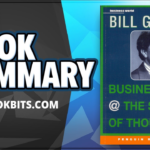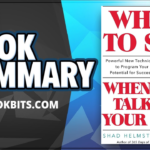JOIN THE ‘BEST BOOK CLUB’ NOW HERE
DOWNLOAD THIS FREE PDF SUMMARY HERE
CHECK OUT THE FOLLOWING Book | 150 PDF Summaries | Course | YouTube
Coaching |Spotify | Instagram | Facebook | Newsletter | Book Club | Website
What Matters Most: The power of living your values by Hyrum W. Smith
In What Matters Most, bestselling author Hyrum W. Smith explains why so many people feel something is missing from their lives because of conflicts between actions and personal values. Through compelling examples from others and from his own extensive experience, Smith outlines a simple but powerful formula to help you identify your own values and live them to the fullest. This strategy consists of three valuable steps:
Discover what matters most to you
Make a plan
Act on that plan
By incorporating Smith’s strategy into your life, you will not only re-embrace your values but you will make them your priority. What Matters Most is an indispensable and timely guide to living a truly fulfilling life and becoming the person you always wanted to be.
Kahlil Gibran said, “In every man there is something wherein I may learn of him, and in that thing I am his pupil.”
Susan Fowler Woodring, has said many times, “People without goals will be used by those who have goals.”
What matters most
Introduction: Mount St. Helens, or Why You Should Read This Book
Vision without action is a daydream. Action without vision is a nightmare. – Japanese proverb
Fundamental values such as respect for human life and for each other, and the necessity of cooperating and working together harmoniously for the common good.
All of us have the ability to do just that – to find greater meaning in life and the fulfillment we all hunger for. We have to get in touch with our most deeply held inner values and live our lives consistent with what matters most.
As a people and a civilization we are capable of thinking anew and acting anew if we can get in touch with the basic assumptions and deeply held inner values we share with every other person on this planet.
We won’t be able to do much about identifying and doing something about the values by which we live collectively as a civilization if we don’t first identify and do something about those values that are most important to us as individuals and families. Just as a journey of a thousand miles is undertaken one step at a time, so the healing of our civilization must take place one individual and one family at a time.
So while the values crisis is a worldwide one, this book will deal with solutions on an individual and family level. It outlines a process that will put you in touch with what really matters most to you. By following that process you will come to know yourself better than you have ever known yourself before. The process is based on natural laws, fundamental principles that have governed personal fulfillment and success for thousands of years.
In the rush and press of modern life, too many have lost contact with the deeply held values that matter, such as close family relationships, fulfilling work, giving of self in service to others, following one’s own inner light, and sharing time and feelings and dreams with those we care about. Helping you identify those deeply held values and then doing something about them in meaningful everyday living is what this book is all about.
Discovering what really matters most to you won’t necessarily be easy. You’ll have to do some digging and expend some mental effort to identify what makes you tick. But if you make the effort, you’ll discover what lies at the center of your being and you’ll be prepared to turn what matters most to you into meaningful goals. Then you can put those deeply held values and goals to work in your daily life. And you will find that you are able to contribute to the larger task of helping your nation and the world community put the most fundamental and shared values to work in the daily life of the planet.
“Be Yourself, but Be That Perfectly”
Part one – The Power of knowing who you are
Wherever you go, go with all your heart. Confucius
Chapter 1 – Heroes: People who know who they are
There is no chance, no fate, no destiny that can circumvent, or hinder, or control a firm resolve of a determined soul. – Ella Wheeler Wilcox
Facts are better than dreams.
Winston Churchill said when you finally decide to take control of your life, to identify what matter most to you, to choose a direction and plan so that you know exactly where you’re going and how to get there, you will have the same sense of relief that Churchill described in the midst of his country’s darkest hour.
In the words of General George C. Marshall who would head the U.S. Army during World War II, no defeat is ever final, it is just preparation for the next and greater battle.
On September 10, 1946, on a long train ride to Darjeeling, India, where she was traveling to recover from suspected tuberculosis, Mother Teresa had a life-changing spiritual experience: “I realized that I had the call to take care of the sick and the dying, the hungry, the naked, the homeless – to be God’s love in action to the poorest of the poor. That was the beginning of the Missionaries of Charity.”
“You cannot think any deeper than your vocabulary will allow you to.”
The best way to build a vocabulary is to read. When you discover a word you don’t understand, look up its meaning so you will know what the author is trying to say.
Recent studies seem to indicate that a large vocabulary is one of the common denominators of truly successful people.
“A great teacher does not lead you to the threshold of his or her knowledge but leads you to the threshold of your own mind.”
Let’s look at some of the patterns common among people who “have it together”:
Self-awareness.
These people know who they are. They know their abilities and strengths, what they are capable of doing, and how to accomplish it. With the power that flows from such knowledge, they are capable of accomplishing the impossible even when physically small or frail (like Mother Teresa).
Confidence
Self-worth
A sense of urgency
A strong sense of personal mission
Personal magnetism
Awareness and respect for their own uniqueness
A consistency to their lives
A sense of calmness and serenity
You are a unique creation, one of a kind, endowed with your own particular mix of talents, abilities, strengths, weaknesses, inner dreams, and potential.
In order to realize who you are, you’ll have to be painfully honest with yourself. You may have to set aside a lot of baggage. You may have to deal with others who have good intentions but no right to tell you who or what you should be.
In the process you’ll find a sense of purpose that may have been hidden for a long time. You’ll also discover a deep and abiding faith in yourself and, more than likely, a strength that comes both from within and, I believe, form spiritual forces beyond yourself. Most of all, you will be able to find the courage to be truly and perfectly YOU.
JOIN THE ‘BEST BOOK CLUB’ NOW HERE
DOWNLOAD THIS FREE PDF SUMMARY HERE
CHECK OUT THE FOLLOWING Book | 150 PDF Summaries | Course | YouTube
Coaching |Spotify | Instagram | Facebook | Newsletter | Book Club | Website
Chapter 2 – “One hundred years ago they had more time”
Never live in the past, but always learn from it. – Anonymous
The only difference between now and one hundred years ago is that we have more options in how we use our time than they had a century ago.
Life in the age of Timelock
As we know all too well, that treadmill is running at a fast pace these days. It’s not just our imagination. Today’s society is definitely into speed. Because of the pace with which things go now, we tend to do things quickly.
Ralph Keyes, a researcher and author of Timelock, wrote a fascinating book in 1991 in which he describes “timelock,” the concept of vehicular gridlock applied to our use of time. “Timelock is the condition that occurs when claims on our time have grown so demanding that we feel it’s impossible to wring one more second out of a crowded calendar,” Keyes wrote. In the words of one of the respondents to his survey, “You prioritize, list your ‘musts,’ then you can’t even get to your musts.”
“The tyranny of the urgent.” The telephone urgently rings in our ears. We can’t ignore it, and if we do, we find ourselves distracted with speculation as to who had called and what the person wanted.
The problem with most urgencies is that they cannot be ignored. Some of them are important, and a few of them are concerned with things that matter most to us. And yet things that are urgent most often typify the “80/20” rule: They occupy as much as 80 percent of our time, but less than 20 percent usually represent things in our lives that are really important.
Urgencies may also take more subtle forms. Sometimes they form a sort of background noise in our lives. If your life is like most, you have plenty of “have-tos,” “shoulds,” “ought-tos,” and “gottas,” many of which probably have little to do with things you attach real importance to.
We do have to make choices: how we’re going to spend our time, with whom we are going to spend it, and also what we’re going to spend our money on. We must choose what we want to commit to emotionally. It is more important than ever to recognize the power of choice. In the midst of all the confusing choices available during the times in which we live, we still have the power to choose our own destiny, to choose where we are going.
The bottom line is that we can be in control of our lives, and that control comes partly from realizing that we are constantly making choices. When people say, “I don’t have time,” what they’re really saying is “I value something else more.”
Understanding that fact is a critical element in getting one’s life in order. If someone were to ask me to have lunch with him tomorrow and I said to him, “I don’t have time,” what I’m really saying is “I value some other event more than having lunch with you.” It is not polite to say that.
Chapter 3 “Someday I’m Going to…”
If one advances in the direction of his dreams, and endeavors to live the life which he has imagined, he will meet with a success unexpected in common hours. – Henry David Thoreau
What do you want to do someday?
I’d like to recommend that you take a few minutes now to let your mind play over the “someday” possibilities that interest you. Jot down a note or two describing what you’d do. Don’t worry about how far out they may seem or whether they are things you “should” want to do. If they are important to you, that’s all the reason you need to include them on your list. The resulting list will be a great help to you as we move into the following chapters because your “someday” dreams will tell you a lot about the things that really matter most to you.
Why new year resolutions don’t work
As each year draws to a close, we as a society go through a little ritual about those “someday” goals.
Have you ever wondered why everyone makes New Year resolutions but very few turn them into permanent behavior change?
Part of the problem is that we have the cart before the horse. We think that by simply setting out a few vague goals, behavior changes will miraculously happen. Setting goals is important and necessary, but it’s not the place to begin. My suggestion is that you delay writing resolutions until you have identified your governing values. What are governing values? They are those things in your life that matter most to you, those things without which you would find life meaningless or unfulfilling, those things that lie at the heart of who you are and who you hope to become. When you better understand who you are and what is important to you, your New Year resolutions will be more easily identified, and you will have a fighting chance of accomplishing some of them in the weeks and months ahead.
Wake up each morning and ask yourself, “What am I going to do today to close the gap between what I am doing and what really matters most to me?”
Part Two – Discover What Matters Most to You
Both nations and individuals can write their own constitutions, and that’s what you’ll do as you discover what matters most to you. Your personal constitution doesn’t have to have lofty language. Let it reflect your personality, your feelings about things, your way of looking at life and events. Your personal constitution will be an important foundation for the rest of your life.
To start with, each of us will find ourselves filling many roles in life. These may be self-selected roles or ones that are thrust upon us by outside relationships or circumstances. Whatever their origins, these roles impact (and are impacted by) our governing values, those core inner feelings and perceptions that govern much of what we do. Both our roles and our governing values impact (and are impacted by) our personal sense of mission, our feelings about what we should be doing with our lives.
Chapter 4 – “What E’er Thou Art, Act Well Thy Part”
A natural human instinct is to want to belong, to have connections to other human beings who share our values or interests. People seek membership in different entities partly because of this need to belong.
Your roles will also change in priority from day to day. A role related to your career will probably rank high from Monday through Friday, only to be bumped out of its position on the weekend by roles related to being a partner, a parent, or roles related to a hobby, a sport, or other non-work interest.
Chapter 5 – What are your governing values?
Without values there is confusion and chaos. When values disintegrate, everything disintegrates. Health disintegrates, poverty attains dominance over affluence, societies and civilizations crumble. When we pay attention to these values that society has always held sacred, then order emerges out of chaos, and the field of pure potentiality inside us becomes all-powerful, creating anything it desires. – Deepak Chopra
Perhaps the best definition of governing values is what we believe to be of greatest importance and of highest priority in our lives. They are different for each person. How well you are able to identify your governing values will determine the degree to which you will come to know and understand the real you.
“What we do depends on how we feel about what we know.”
“When we allow our performance to be incongruent with our governing values, it is excruciatingly painful and palpably stupid.”
When you bring your performance in line with what you value, you experience an inner sense of peace.
When you get into this process – actually identifying, clarifying, and starting to write descriptions of what these values are-a renewed sense of power will come into your life. You’ll know that you are in charge, that you are the master of your ship, and that you have made some very basic decisions that will help you change behavior that may have been causing pain.
One very important fact must be kept foremost in your mind as you get into this process: Identifying, clarifying, and writing down governing values is not a singular event that you do once in your life and then it’s forgotten. This is a very dynamic evolutionary process. Governing values have to be revisited constantly, challenged, thought about, internalized, and worked with.
Four Natural Laws About Governing Values
As you begin the process of looking inward and examining your governing values, keep in mind that natural laws are associated with governing values. I define natural laws as fundamental patterns of nature and life that human experience and testing have shown to be valid. They describe things as they really are, as opposed to how we think they are or how we wish they were. Natural laws exist and operate whether we believe and accept them or not; like the law of gravity, they just are. We can work with natural laws and live our lives safely and successfully, or we can ignore them or try to fight against them and experience pain and frustration.
The first natural law could be stated this way: Whether we consciously realize it or not, we have inner values that strongly influence our outward behavior.
The second natural law is an extension of the first: Our natural inclination is for our actions to be consistent with these deeply held governing values.
The third natural law is this: By identifying and clarifying our governing values, we can tap their power to increase our personal effectiveness.
Lastly, there is this natural law: When our behavior is in line with our governing values, we experience inner peace.
Write a clarifying statement
Once you have your compact list of governing values, write each one on a note card or piece of paper and take a moment to write a few sentences that clarify what that value means to you. This may be a more in-depth description of the value, or it may be more of a statement about why it is important to you, or it may be a little of both. Just write it in a meaningful way that will motivate you.
Prioritize your values
Once you have identified what your governing values are, a very important next step is to place them in order of their importance to you. This can be a very difficult task.
“What would I cross the I beam for?” It’s a marvelous question because the governing values you identify are probably those that are most important to you, that matte most to you. And you may find that only two or three of the values on your list will qualify.
Look at your final list of governing values and their clarifying statements. Then rank or reorder the list to reflect their relative importance to you. Put the most important values at the top of the list, the least important at the bottom.
Can our governing values be changed?
You can decide that you don’t like a particular value. You can decide to add or eliminate a governing value. You can decide to change your interpretation, your understanding, and your definition of a particular value. You can decide that a particular governing value has greater priority in your life than it previously had. That’s what separates human beings from the rest of the animal kingdom. We can change our values. Not only that, identifying and clarifying your governing values can be a tremendously liberating experience. It can expand your horizons and help you to see new possibilities in life. When you discover what really matters most, you don’t need to pretend or compare yourself with anyone else. You can start being yourself in the truest sense of the phrase.
JOIN THE ‘BEST BOOK CLUB’ NOW HERE
DOWNLOAD THIS FREE PDF SUMMARY HERE
CHECK OUT THE FOLLOWING Book | 150 PDF Summaries | Course | YouTube
Coaching |Spotify | Instagram | Facebook | Newsletter | Book Club | Website
Chapter 6 – What is your personal mission in life?
He who has a why to live for can bear almost any how. – Nietzsche
Are you living your life in a fog?
The lack of personal vision can be physically and emotionally debilitating. You have a hard time getting out of bed. You move sluggishly. You’re not excited. There is no anticipation about the day, no looking forward to getting up in the morning. At best, all you want to do is exist and get by. There isn’t any fun in life, no sense of fulfillment.
But the minute you create vision in your life – and that’s what we’re talking about when we talk about discovering what matters most – the energy comes back. You can’t wait to get up in the morning. You know exactly where you’re going and why you’re doing what you’re doing.
With vision there is a sense of urgency, a divine impatience for life.
Your personal mission in life is all your roles and values distilled into a sentence or two that describe what you want to be and accomplish in your life.
Writing your personal mission statement
A personal mission statement…..
…..represents the deepest and best within you. It comes out of a solid connection with your inner life.
….is the fulfillment of your own unique gifts. It’s the expression of your unique capacity to contribute.
……is transcendent. It’s based on principles of contribution and purpose higher than self.
…..addresses and integrates all….fundamental human needs and capacities. It includes fulfillment in physical, social, mental, and spiritual dimensions.
…..is based on principles that produce quality-of-life results. Both the ends and means are based on true principles.
….deals with both vision and principle-based values. It’s not enough to have values without vision; you want to be good, but you want to be good for something. On the other hand, vision without values can create Hitler. An empowering mission statement deals with both character and competence.
….deals with all the significant roles in your life. It represents a lifetime balance of persona, family, work, community-whatever roles you feel are yours to fill.
….is written to inspire you, not to impress anyone else. It communicates to you and inspires you on the most essential level.
As Stephen Covey has stated, “We don’t invent our missions, we detect them.”
- What single thing do I want to be remembered for?
- What is the most important legacy I can leave to family, friends, and associates?
There are no right or wrong mission statements, just your mission statement. There is no right or wrong way to express your mission.
Let me share some examples of what has been included in the mission statements of people I know:
- To create joy
- To have peace
- To make a difference
- To raise a fine family
- To contribute to society
- To bring beauty into people’s lives
- To excel in my field
- To find success and fulfillment through purposeful living
Remember, the important thing is to identify a mission statement that is uniquely yours. Don’t just pick a mission statement from among those I’ve listed or others you may be aware of, especially if you are doing so largely because of “I should” or “I ought to” feelings.
This written summation of what you are and what you want to do should be something you have some passion about, something to which you are willing to dedicate your life. Only then will it become an inner power that will move you toward fulfillment of your inner and unique destiny.
Chapter 7 – “The Greatest Force in Creation…”
There is only one miracle, and it is already accomplished. That miracle is the human soul. – Hermann Hagedorn
“The power to lead is the power to mislead, and the power to mislead is the power to destroy.”
Part Three – Doing something about what matters most
Knowing is not enough; we must apply. Willing is not enough; we must do. Goethe
We might liken the solid rock on which the pyramids rest to the bedrock you have discovered in the past three chapters, the sure foundation of who you are and what matters most to you. And as you build on that solid foundation, you can make of your life a monument that truly reflects your personality and uniqueness.
The three major levels of developing your own Personal Productivity Pyramid, a way to represent the What Matters Most process as a pyramid built solidly on the foundation you have uncovered in the previous chapters.
As we look at the process of building the pyramid of your life, take heart in the fact that you have already uncovered the bedrock-you have discovered who you are and what matters most to you.
JOIN THE ‘BEST BOOK CLUB’ NOW HERE
DOWNLOAD THIS FREE PDF SUMMARY HERE
CHECK OUT THE FOLLOWING Book | 150 PDF Summaries | Course | YouTube
Coaching |Spotify | Instagram | Facebook | Newsletter | Book Club | Website
Chapter 8 – Use the inherent power in planning
Failing to plan is a plan to fail. – Effie Jones
Planning is predetermining a course of events – working through what must happen if a desired result is to be brought to pass. As you have progressed through the process of identifying what matters most, you most likely have a clearer vision of what those things are and what you want to do about them. The next step is effective planning, the key to making sure that you do something now about those things that matter most.
The only thing I would add to our definition that planning is predetermining a course of events are these two words: in writing. Why is writing important? Simply stated, writing your plan is vital to actually seeing it happen.
A dream or a goal
At this point we should probably talk about the difference between a dream and a goal. A goal is a dream with a deadline. Having a deadline on your dream will take it out of the limbo of “someday.” The dream will acquire a life of its own, a time frame within which it will be accomplished. Your mind can envision its completion and how you will feel and how life will be different when its purposes have been implemented. The simple act of writing down a goal starts to unleash power and momentum that will help you see it accomplished.
Don’t be afraid of the power in planning
One of the biggest reasons that we don’t usually plan is the fear of commitment and its close cousin, fear of failure.
This fear of commitment and consequent failure is actually one of the strongest evidences of the power that preparing a written plan can bring to any endeavor.
Remember that the difference between a dream and a goal lies in writing your plan down. If you don’t put it on paper, I can almost guarantee that you’ll fail. Your goal will remain only a “someday” dream. You must now turn your plan into action.
Chapter 9 – Make it so!
One can choose to go back toward safety or forward toward growth. Growth must be chosen again and again; fear must be overcome again and again. – Abraham Maslow
Make it so!
I’ve always been impressed with the military command phrase used in the science fiction series Star Trek. When Captain Jean-Luc Picard of the Federation Star Ship Enterprise issues an order, he doesn’t just say, “Do it!” or “My orders are to…..” He says, “Make it so!” I especially like both the delegation of personal responsibility and the bias for action that is inherent in that phrase. You don’t just do something in response to that command; you also take the responsibility to make it happen.
Understand the Difference Between Urgent and Important
When we tell someone we don’t have time, what we’re really saying is that we value something or some other event more.
In the process of actually doing something about what matters most, you must learn how to deal with all the other events and time consuming things that will be thrown at you.
In order to deal with these competing priorities in the use of your finite time resources, you must decide the urgency as well as the importance of events and activities.
Unfortunately, the things that mater most are too often at the mercy of the things that matter least. Even among the things that are important, the nonurgent events and activities too often end up being bumped by the urgent ones.
And to compound the problem, the important things too often get elbowed out by the non-important things, including almost all our person time-wasters.
Perhaps what we’ve talked about here can be summed up in two key natural laws:
- Our priorities are the things that are truly important in our lives.
- Urgencies are not our true priorities; they act on our true priorities.
It is important to remember these two statements as you start to do something about the things that matter most. The urgencies, whether important or unimportant, will always be there, ready to divert you from the things that matter most. You’ll have to do whatever is possible to protect your time and learn how and when to say no or how to gracefully move out of a time-wasting situation. You will need to make time to work on your true priorities, including what matters most to you.
Place the Big Rocks First.
The rocks and pebbles metaphor is helpful to remember as you seek to implement your own plans for doing something about what matters most. The glass jar is the time that is available to us in a typical week. The large rocks are the activities and events related to the things that matter most. The pebbles are all those little tasks and things that fill up our lives. The sand could represent the many ways we spend our waking time. The water might represent the time we are sleeping.
I suggest that you set aside a time each week for your planning time. In your weekly session you’ll want to do the following:
- Review What Matters Most. The first thing to do during this time is review your written roles, governing values, and Personal Mission Statement so that you can keep those things uppermost in your mind as you proceed.
- Review your what matters most long-range goals. Look over the goals you have formulated and determine which of the intermediate steps could be addressed this week.
- Select the goals and intermediate steps you want to work on this week. Here you’re selecting and creating a list of the “big rocks” – the events or activities you want to make sure get in the jar for the coming week.
- Schedule the events beyond your control. These would be the absolute “have-tos” – meetings, appointments, and other events or activities over which you have little or no control. Since you cannot change them, you need to know where they fall so that you can schedule around them.
- Schedule the big rocks. These are the intermediate steps related to what matters most. You’ll need to be sure they have a place in the jar.
- Schedule everything else. With the big rocks in place, you can now fit the pebbles in around them. If your schedule is busy, be sure to leave some breathing room, especially around the big rocks.
Time Now to ACT
With your week planned, it’s time to take action, to do things that will produce the results you desire. Remember that action always takes place in that dynamic moment of time we call right now.
With Laser Thinking in the moment of decision, you will be able to see through the fog and cut through all the clutter to see which events and activities will further what matters most to you on any given day and which events and activities are just filler.
Fighting Our Demons
The most effective tool I have discovered in whipping the demons is to have regular victories in my life every single day. When you do something right, take a moment and savor the feeling. Even a little victory does wonders for your confidence and motivation. Make a conscious effort to successfully complete some task each day related to something that really matters to you. That’ll help keep the demons at bay.
Fear of Failure
There are many types of diseases that afflict the human body, and we spend millions and perhaps billions of dollars trying to find cures. But there is one disease of epidemic proportions in our society on which we spend little or no money or effort – the crippling disease called fear of failure.
There was really nothing wrong with failure. It was part of the learning process, and the point was to get back on course after messing up.
Closely related to the fear of failure is the fear of change.
Comfort zones, those places and conditions we gravitate to by the paths of least resistance, usually by default. Leaving our comfort zones can be difficult unless, we realize that doing so can be an adventure, a rejuvenating and exhilarating experience.
If we can consider leaving comfort zones as adventures, then we won’t be afraid to fail and can understand that we might fail many times before we eventually succeed.
A person never hits a home run without taking a very healthy swing at the ball. And today no one remembers Babe Ruth’s strikeouts. Remember, failing is nothing more than a lesson for the next and greater battle.
There is a wonderful story about a very successful entrepreneur who was asked why he was so successful. His response was “Good decisions.” The second question was “Well, how do you make good decisions?” The response: “Experience.” And then the final question: “How do you get experience?” And the response: “Bad decisions.”
We learn by our experience. We learn by mistakes. We learn by failing. We learn by attempting something. Sometimes it works and sometimes it doesn’t, but we find the better way. Do whatever it takes to get the fear of failure out of your system. Failure is a marvelous, magnificent blessing that teaches us how to grow.
JOIN THE ‘BEST BOOK CLUB’ NOW HERE
DOWNLOAD THIS FREE PDF SUMMARY HERE
CHECK OUT THE FOLLOWING Book | 150 PDF Summaries | Course | YouTube
Coaching |Spotify | Instagram | Facebook | Newsletter | Book Club | Website
Chapter 10 – What’s on your belief window?
We don’t see things as they are, we see things as we are. – Anais Nin
You cannot actually see your Belief Window because it’s invisible, but we all have one. It is figuratively attached to your head and hangs in front of your face. Every time you move, that window goes with you. You look at the world through it, and what you see is filtered back to you through it.
Your Belief Window is always with you, filtering what you see – the oceans of data and information through which you must navigate each day – and helping you make sense of the world around you. It influences the way you perceive others, the way you read situations, and the feelings you have about yourself. And if there is information you do not wish to “see” or acknowledge, you use your Belief Window to filter it out and keep it away from you.
The tricky thing about the Belief Window is that you have placed perceptions on it which you believe are absolutely true, whether they reflect reality or not.
Until we realize that we view the world through our Belief Windows and that it constantly filters our experiences, we will continue to think that we see life “as it really is.” But unless our Belief Window truly reflects reality – things as they really are, not as we wish they were or think they should be – we find that we can easily fool ourselves and potentially damage our chances for success in any activity we undertake.
What is written on your belief window?
On our individual Belief Windows we have placed all the things we consider true about the patterns we see in the world, ourselves, and those around us.
Everyone has a mix of correct, incorrect, and debatable beliefs on their Belief Window. All of them influence behavior.
Your belief window influences your actions
“Good judgment comes from experience; experience comes from poor judgment.” Our experiences cause us to alter our beliefs, adopt new ones, or give them a higher value.
Results often take time to measure
Growth is the process of updating your belief window
Understand that when any of our basic needs are not being met, all of our energy automatically flows to meeting that need.
There arrives a point in time when we must take total responsibility for our behavior. You can’t blame it on the neighborhood anymore. You can’t blame it on your genes. You can’t blame it on the fact that you’re from some hick town. You alone are responsible for your behavior. If that’s true, what else are you totally responsible for? You are responsible for what stays on your Belief Window. The thing that separates you and me from the rest of the animal kingdom is that we can change our Belief Window.
“Will the results of this behavior meet my needs over time?”
Take the time to examine closely what is on your Belief Window. If you find beliefs or perceptions that are hindering you and holding you back, remember that they can be changed for beliefs that will serve you better. The closer your belief and perceptions are to reality, to things as they really are, the more successful you will be in meeting life’s challenges and in living in accordance with what matters most.
Part Four – What Matters Most the Broader View
It is good to have an end to journey toward, but it is the journey that matters in the end. – Ursula K LeGuin
Chapter 11 – Organizations also need to know who they are
Like the fundamental ideals of a great nation, church, school, or any other enduring institution, core ideology in a visionary company is a set of basic precepts that plant a fixed stake in the ground: “This is who we are; this is what we stand for; this is what we’re all about.” – James C Collins and Jerry I Porras, Built to Last: Successful Habits of Visionary Companies
Just as individuals find their lives more focused on what matters most and more fulfilling when that happens, families need to do the same. The members of a family need to identify what their roles are, in both the immediate and the extended family, as well as in the neighborhood and community a family functions more successfully if its members clarify and put in writing the underlying values that govern or should govern the family, even going so far as to synthesize those roles and values into a simple, memorable, and motivational Family Mission Statement.
The family, like any organization, exists to serve the needs of its members and should not override individual values. This generally involves a bit of a balancing act and a lot of give and take, but the rewards in terms of making the family an organization within which all family members can flourish are immeasurable.
A visionary company almost religiously preserves its core ideology-changing it seldom, if ever. Core values in a visionary company form a rock-solid foundation and do not drift with the trends and fashions of the day; in some cases, the core values have remained intact for well over one hundred years…..Yet, while keeping their core ideologies tightly fixed, visionary companies display a powerful drive for progress that enables them to change and adapt without compromising their cherished core ideals.
JOIN THE ‘BEST BOOK CLUB’ NOW HERE
DOWNLOAD THIS FREE PDF SUMMARY HERE
CHECK OUT THE FOLLOWING Book | 150 PDF Summaries | Course | YouTube
Coaching |Spotify | Instagram | Facebook | Newsletter | Book Club | Website
Chapter 12 – What matters most: Influence in a Wider Circle
Nelson Mandela, In his autobiography wrote:
The oppressor must be liberated just as surely as the oppressed. A man how takes away another man’s freedom is a prisoner of hatred; he is locked behind the bars of prejudice and narrow-mindedness. I am not truly free if I am taking away someone else’s freedom, just as surely as I am not free when my freedom is taken from me. The oppressed and the oppressor alike are robbed of their humanity.
Expanding our influence beyond our immediate circle
For many years Stephen Covey has taught that each of us has a personal circle of influence, a large or small group of people with whom we can make a difference or on whom our words and actions have some effect.
Our circle of influence is generally smaller than the second circle that encompasses it – our circle of concern. We may be concerned about many things – global warming, wars and famines in the world, the dumbing down of our culture, the increasing lack of civility on a societal scale – but we usually don’t have enough personal influence to do a great deal about them. Within our personal circle of influence, however, we can make a difference. Armed with a clearer understanding of who we are, what matters most to us, and what we are about, we can also find our circle of influence greatly expanded and our ability to make a difference vastly increased.
Chapter 13 – Life is not set in concrete
Life, as I see it, is not a location, but a journey. Everything is in flux and is meant to be. Life flows. We may live at the same number of the street, but it is never the same man who lives there – Henry Ford
A Journey, Not a Destination
I’ve always liked the idea that life is a journey, not a destination. It gives a truer perspective. Just as the scene from the window of a moving automobile or train is constantly changing, so are our lives. One of the best ways to see how your life changes is to read a journal entry, a letter, or something else you wrote about your life ten or twenty years ago. Or look at a photo taken of you or your family a decade or two back.
The day-to-day changes in our lives are gradual, it takes comparative views of the same thing, taken years apart, to see and appreciate what has taken place.
Your governing values will also change over time, in part because your roles change and in part because new experiences will bring new insights and new opportunities. Sometimes values change simply because of the stage of life you are in.
Life is a process, not an event. We have lots of opportunities to correct the mistakes that we make. That’s what progress is all about. That’s what growth is all about as an individual or as an organization. If we’re willing to take each defeat as a lesson for the next and greater event, we’ll be better prepared for that next and greater event.
Chapter 14 – Your Inner Reward: Living the Abundant Life
Life begets life. Energy creates energy. It is by spending oneself that one becomes rich. – Sarah Bernhardt
What does it mean to live an abundant life? It has a lot to do with the seeming paradox expressed in the old saying: “It is only in giving that we truly receive.” Living the abundant life means to have every
“If you serve your fellow beings, things are better, both for you and for them.”
“The minute we are able to honestly look ourselves in the mirror and say, ‘I have sufficient for my needs,’ at that point we are wealthy.”
The whole idea of casting your bread on the waters and having it come back tenfold is, I discovered, a natural law of the universe.
You cannot understand the feelings that come from helping someone in need with your abundance until you have done it – and done it in a way that only you and the people you’re helping know about it.
Some of the most fulfilling things you can do are those in which you give of yourself to meet the needs of others. People all over the world are in desperate need, much of it the result of events or circumstances not of their own making. Whatever the source of those needs, people all over the world are praying for various kinds of help. We have the opportunity to provide answers to those prayers. When we feel those promptings to help, let’s help and thereby discover the peace, joy, and transformation that can occur on an individual, a community, a national, and even a global level.
Conclusion: You Can Do It!
I know this now. Every man gives his life for what he believes. Every woman gives her life for what she believes. Sometimes people believe in little or nothing, and yet they give their lives to that little or nothing. One life is all we have, and we live it as we believe in living it and then it’s gone. But to surrender what you are and to live without belief is more terrible than dying – even more terrible than dying young. – Joan of Lorraine, play by Maxwell Anderson
You can do anything you want to if you want to do it badly enough.
If you’re willing to pay the price, you can do anything you want to do.
There isn’t anything you can’t do if you want to do it.
Of course the desired results don’t necessarily happen in a day or even a month or a year. They will come imperceptibly, through little daily victories when what matters most truly becomes a part of your everyday life. When those personal victories come, the increase in self-worth, the sense of well-being, the sense of oneness with oneself are things that no one can take away.
Whatever matters most to you, you can do something about it.
Let me share excerpts from poem that provide valuable insights. The first is the last verse of “Every Day.”
Oh, one might reach heroic heights
By one strong burst of power.
He might endure the whitest lights
Of Heaven for an hour.
But harder is the daily drag
To smile at trials that fret and fag,
And not to murmur nor to lag.
The test of greatness is the way
One meets the eternal every day.
The big victories don’t come to those who are the fastest, the smartest, the brightest, the wealthiest. The victories come to the people who get up every time they fall.
Discover the uniqueness of yourself. Identify the roles that matter to you. Write your own constitution by identifying and clarifying those governing values. Create a motivating Personal Mission Statement, defining the mission that has always been there but never before put in writing. Spin those electrons around the nucleus that is you and discover the power that comes when real focus and vision come into your life.
JOIN THE ‘BEST BOOK CLUB’ NOW HERE
DOWNLOAD THIS FREE PDF SUMMARY HERE
CHECK OUT THE FOLLOWING Book | 150 PDF Summaries | Course | YouTube
Coaching |Spotify | Instagram | Facebook | Newsletter | Book Club | Website

